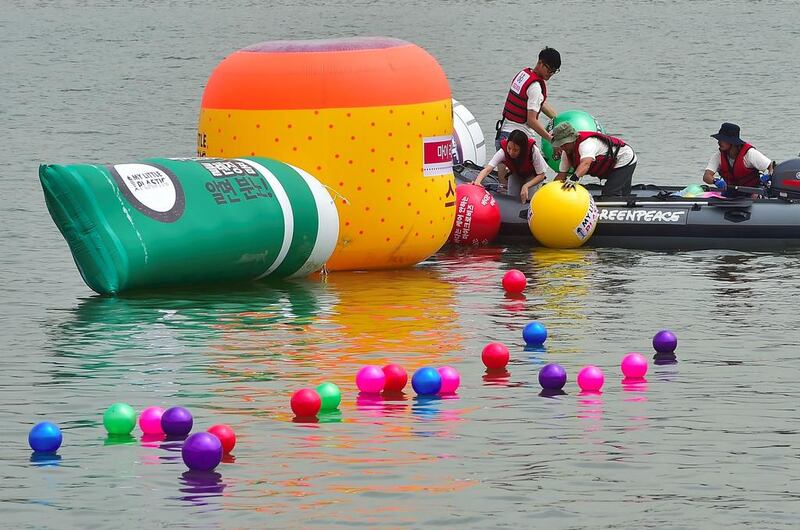A project by a group of schoolgirls has turned into their mission to have microbeads, small pieces of plastic that are found in exfoliants and household cleaners, banned in the UAE as a matter of urgency.
ABU DHABI // A UAE school project raising awareness of the impact of microbeads might pale into insignificance in comparison to a US government ban and an impending one in the UK.
But the girls involved are hoping their efforts travel far.
Microbeads, commonly found in beauty products with exfoliating properties, are tiny pieces of plastic made from polyethylene that are small enough to pass through municipality filtration systems.
An academic article in the journal Science last year estimated that products containing microbeads and other plastics dump about 8 million tonnes of plastic into our oceans every year – equal to the weight of about 1.5 million elephants.
Pupils at the Universal American School of Dubai started the project as a class assignment but have since been encouraged to raise awareness on a topic they believe is neglected.
“It’s not something that is obvious to lots of people and a lot of people don’t know that they might be consuming plastics every single day,” said Jana Ali, a pupil working on the project.
The pupils echoed the scientific community’s findings in recent years that plastics that end up in the ocean are regularly ingested by marine life, possibly even more so if they are microplastics.
The petrochemical beads can then end up on our plates when we eat seafood.
“It has been estimated that an average plate of oysters could contain up to 50 plastic particles,” said Prof Tamara Galloway, of the ecotoxicology department at the University of Exeter in the UK.
“We don’t yet have any evidence for the harm that this might cause but most people would probably prefer not to be eating plastic in their food.”
The risk for the environment and health prompted US president Barack Obama to outlaw microbeads last year, with the UK and Canada following suit by the end of this year.
But the UAE as yet has no legislation governing the use of microbeads.
A survey of several supermarkets in the UAE found the products readily available in cosmetic products and household cleaning supplies.
Some companies, however, knowing the effects on health and the environment, have taken pledges to halt the use of the gimmicky product to lessen their environmental impact.
A list of companies involved can be found at beatthemicrobead.org/en.
The girls at the Universal American School say that microbeads are not even necessary as their effects can easily be replaced.
“You don’t need to exfoliate using these products alone, you can just as easily get a wash cloth that can have the same result,” said Layla Atallah, a pupil working on the project.
Greenpeace has welcomed the US ban but said that the same attention should be given to other plastics.
“Ocean plastic does not disappear by itself, so for every bit that ends up in the ocean, it means more cleaning up – with much of it impossible to tackle at all,” the Greenpeace website says.
“Not to mention that if you eat fish some of this plastic could end up on your dinner plate.”
A ban of microplastics in the UAE could be heralded as a step towards improving the country’s waste disposal mechanisms, as was outlined in the Nationally Determined Contributions agreement.
The NDC was a legally binding agreement that the UAE pledged at Cop21 in Paris last year and further reinforced during Cop22 in Morocco. It is part of a bigger plan to limit global warming to less than 2°C above pre-industrial levels by 2050.
nalwasmi@thenational.ae





